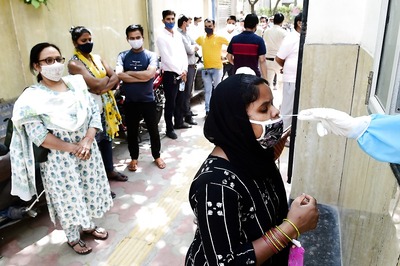
views
Ajdabiya: Libya's rebel forces advanced once again to the strategic oil town of Brega thanks to four days of airstrikes by NATO, a rebel officer said on Saturday.
Following scattered clashes with government forces, the rebels reached the outskirts of Brega, which has already changed hands half a dozen times since fighting began in early March, Col. Hamid Hassy said. Explosions that appeared to be from new airstrikes could still be heard Saturday in the area.
For four days, rebel forces have maintained their positions around the city of Ajdabiya, about 30 miles (50 kilometers) to the east, allowing airstrikes to weaken government forces, Hassy said. On Friday, however, the fighters pushed in to reach Brega's university campus, just outside the town's oil port. He said that if rebels retake Brega, they will bring engineers to repair any damage to the refinery and oil facilities there.
Government troops, meanwhile, continued their powerful assault with tanks and rockets on Misrata, the last major rebel city in western Libya. The city has become emblematic of the limits of NATO's air campaign, with the alliance's top military commander saying he needs more precision attack aircraft to avoid civilian casualties in urban combat.
Rebels in Misrata and the New York-based group Human Rights Watch have alleged that Gaddafi's forces have been using cluster bombs, which pose particular risk to civilians because they scatter small bomblets over a wide area. Most of the world's nations have banned the use of the munitions.
Human Rights Watch said its researchers inspected remnants of the weapons found in a Misrata neighborhood and interviewed witnesses.
Late on Friday, Libyan government spokesman Moussa Ibrahim denied the use of cluster bombs. "Absolutely not," he said when asked about the allegations. "We can never do this. We challenge them to prove it."
US Secretary of State Hillary Rodham Clinton said she was unaware of the reports about the use of cluster bombs.
"I have to say I am not surprised at anything that Col. Gaddafi and his forces do, but that is worrying information and it is one of the reasons why the fight in Misrata is so difficult," Clinton said. "It is at close quarters, it is in amongst urban areas and it poses a lot of challenges to both NATO and to the opposition."
The latest fighting in Brega pushed the rebels back to the town's outskirts, said Suleiman Mohammed Suleiman, one of the opposition fighters. He lay groaning on a hospital bed in Ajdabiya being treated for a bullet in the leg he received while firing a heavy machine gun from the back of a pickup truck outside Brega.
Suleiman said the rebels could see Brega but were not yet inside.
The NATO-led air campaign has rebels from being outright defeated on the battlefield by the better trained and equipped government forces, but it still has not been enough to completely turn the tide.
At a two-day meeting of NATO foreign ministers in Berlin, the United States and its allies put up a united front on the goals of the alliance's stalemated military mission in Libya but failed to resolve behind-the-scenes squabbling over how to achieve them.
NATO members agreed on paper that Gaddafi had to go to end the crisis, they also made clear that they would not be the ones to oust him.
Previous rebel advances through Brega and its sister oil center of Ras Lanouf, another 60 miles (100 kilometers) further on, have ultimately foundered as rebels overextended their supply lines and were routed by the heavier firepower and more sophisticated tactics of the government forces.
Mohammed Kikley, a rebel volunteer, said he was in Brega on Friday, but when he tried to return the next day he was stopped by heavy fighting and shelling. The hospital in Ajdabiya said two rebels were killed in Friday's fighting.
So far, the airstrikes have not been enough to sufficiently degrade government forces to allow the rebels to reach Gadhafi's heavily defended hometown of Sirte, the gateway to the regime-controlled western half of the country.
In contrast to their pell-mell charges and retreats in the past six weeks, the rebels appear to be trying a more gradual advance that might actually result in them holding territory.
The rebels acknowledge that their forces - defected army units and armed civilians - can't defeat Gadhafi on their own. Mustafa Abdul-Jalil, head of the rebels' National Transitional Council, said this week that without NATO airstrikes, even Benghazi, Libya's second-largest city and the rebels' main stronghold, would be in "complete danger."



















Comments
0 comment